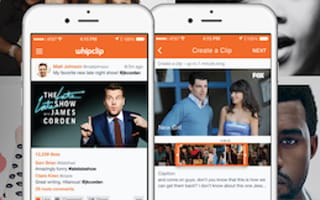[ibimage==38476==Original==none==self==ibimage_align-center]
Silicon Beach grew out of a very specific need. As technology progressed, Hollywood sought new ways to utilize it, fostering a tech community that has grown exponentially in the past five years.
Specifically, ad tech and Hollywood have created a uniquely symbiotic relationship. With the growing number of mobile users and the transition to online viewing, Hollywood has evolved its content, and with it, its advertising. We sat down with two CEOs who have both been involved in entertainment ad and content tech for over 15 years.
[ibimage==38474==Original==none==self==ibimage_align-left]Rich Rosenblatt, CEO Whipclip
After entering the Santa Monica tech scene in 1994, Rosenblatt has spearheaded numerous content driven companies including Demand Media and his current endeavor, Whipclip, which received a $40 million Series C funding today. By creating relationships with various content providers, Whipclip gives the users the ability to legally create and share clips of their favorite TV moments.
How does your company stand out in the LA content-related tech space?
“We’re able to provide the Hollywood scene free promotion for their content. What they’re afraid of is people stealing their content — which occurs a lot — but we took a different approach. We went to them the first day of starting our company and said ‘not only are we going to ask permission for your content but we’ll put an end card on every clip where we send 100 percent of the traffic back to you. That’s a different approach for content providers who are used to companies using their content without permission and claiming fair use.’”
How has the relationship between Hollywood and tech evolved?
“The openness and understanding of the content companies has grown immeasurably. Their teams now fully get and embrace the internet, whereas, for the first decade, all the content companies saw the internet as a real threat. Now they recognize the potential power in using it properly. Now, in meetings, they’re not skeptical, they’re enthusiastic about where to spend their resources. They’re thinking about the best way to use the internet to grow their business, and that’s a fundamental change.”
Is that relationship going to change as more people watch content on mobile devices? Do you believe that trend will continue?
“It’s all mobile first. I still believe in the web but when you look at the stats, mobile is a huge part of viewership when people aren’t at work. But I would not ignore the web, but mobile first for sure.”
“And I don’t think the TV is going away. People still spend 95 percent of their time watching things on TVs. That hasn’t changed. A survey we conducted said that 80 percent of people who discover something on WhipClip say they are going to watch it on TV. People are still watching TV. It’s not growing but it has not gone away.”
[ibimage==38475==Original==none==self==ibimage_align-left]
Matt Cooper, CEO Addroid
Fifteen years in the entertainment ad tech industry has allowed Matt Cooper to develop a strong foresight into the direction of the space. His current company, Addroid was spun out of necessity when his movie banner and website generating company, Neoganda, realized Google Chrome would be blocking Flash on mobile devices in September 2015. The company now delivers high quality creative for companies seeking longstanding mobile-compatible banners, primarily in the entertainment industry.
What makes Addroid so unique in crowded ad tech space?
“We’re the Krispy Creme of ad tech— we have this one product but it is so good, so well-refined and hard to duplicate in all of its fluffy deliciousness that we’ve built a business around this one product. As soon as it was built we were able to monetize it and collect revenue. If the internet was a bakery, this is like flour stops working in September. The fundamental ingredient in digital advertising won’t be available anymore.”
How have you seen Hollywood’s approach to online marketing change over the years?
“There was a lot of fear in the beginning. I started in the entertainment industry in 2001 when we built the site Finding Nemo. Back then, it was just a lot of experiments. People were just having fun with it like ‘build this website or do your internet thing’— they treated it like it was a CB radio. Now it is pretty much TV. Millennials watch all their entertainment on phones or laptops. It’s where the eyeballs are and they are very aware of that. You have to go where the audience is.”
Mobile viewership is growing at an insane pace. Will Hollywood’s entrance into apps like Snapchat change the way people consume content?
“Ultimately, mobile is everything. It’s to the point where people need to stop talking about mobile as its own silo and just go back to calling it the internet. As for Snapchat, I don’t know if people go to it for content, I think it's more of a personal platform and millennials might not want to consume content that way. But brands are finally adopting video on mobile and video is becoming the new standard which is a great trend for everyone.”
Have a tip for us or know of a company that deserves coverage? Email us via [email protected]



